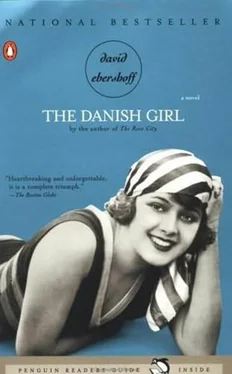How old was Lili? She was younger than Einar, who then was nearly thirty-five. When Lili emerged and Einar withdrew, years were lost: years that had wrinkled the forehead and stooped the shoulders; years that had quieted Einar with resignation. Lili’s posture was the first thing one might notice, its fresh resilience. The second was her soft-voiced curiosity. The third, as Greta reported it, her smell-that of a girl who hadn’t yet soured.
“I really can’t say.”
“You don’t seem like the type of girl who’s too coy to admit her age,” Hans said.
“I’m not,” Lili said. “I’m twenty-four.”
Hans nodded. It was the first fact made up about Lili. As Lili said it, she assumed she’d feel guilty about lying. Instead she felt a bit freer, as if she ’d finally admitted an uncomfortable truth. Lili was twenty-four; she certainly wasn’t as old as Einar. Had she said so, Hans would have thought her a strange fraud.
Hans paid the clerk. The bottle was square and brown, its cork stopper no bigger than the tip of Lili’s pinkie. She tried to pull it out, but couldn’t pry it loose. “Help me?” Lili asked.
“You’re not as helpless as all that,” Hans said. “Give it another tug.”
And Lili did, and this time the little cork popped free and the scent of oranges rose to her nostrils. It made her think of Greta.
“Why don’t I remember you from when I was a boy?” Hans asked.
“You left Bluetooth when I was very young.”
“I suppose that’s right. But Einar never said he had such a beautiful baby cousin.”
When she returned to the apartment, Lili found Greta still in the living room. “Thank God you’re back,” she said. “I want to work some more tonight.” Greta led Lili, who was still holding her packages of the soaps and orange oil, to the camelback sofa. She arranged Lili against the pillows and, with her fingers spread across Lili’s skull like a many-pronged clamp, turned her head toward the Chinese screen.
“I’m tired,” Lili said.
“Then go to sleep,” Greta said, her smock smudged with oily pinks and silvers. “Just lay your head against your arm. I’m going to keep painting a little more.”
The next afternoon, Hans met Lili at the gate of the apartment. Again they walked through the narrow streets that swirled around St-Michel’s hill, then down to the harbor to watch two fishermen sort through their haul of sea urchins. In late August, Menton was hot, the air humid and still. So much warmer than the hottest summer day in Copenhagen, Lili thought. And because Lili had never known such heat-this, after all, was her first trip out of Denmark-she found the weather exhausting. She could feel the housedress sticking to her back as she stood next to Hans, watching the wet net bulging with urchins, Hans’s body so close to her own that she thought perhaps she could feel his hand on her arm, which was burning in the sun. Was it his hand, or something else? Simply a hot breeze?
Two Gypsy children, a boy and a girl, approached Lili and Hans, trying to sell them a little carved elephant. “Real ivory,” they said, pointing at the elephant’s tusk. “A deal for you.” The kids were small and dark around the eyes, and they stared at Lili in a way that made her feel unsafe.
“Let’s go,” she said to Hans, who laid his hand on the warm wet small of her back, steering her away. “I think I need to lie down.”
But when Lili returned home, Greta was waiting for her. She posed Lili in front of her easel, settling her on the sofa. “Sit still,” Greta said. “I’m not done.”
The next day Hans drove Lili up the corniche to Villefranche, his Targa Florio’s spoke-wheels shooting shellrocks down to the sea. “Next time don’t leave Einar up in Denmark!” he yelled, his voice as pebbly as it was when he was a boy. “Even good old Einar should have a holiday!” The wind was warm in Lili’s face, and by the late afternoon again she was feeling weak in the stomach. Hans had to rent a room at the Hôtel de l’Univers for Lili to rest in. “I’ll be just downstairs having a coffee and an anisette,” he said, tipping his hat. Later, when she emerged from the narrow room, Lili found Hans off the lobby in the Restaurant de la Ré gence. She was barely out of her dreamy state and only said, “Sometimes I just don’t know what’s wrong with me.”
On another day-trip Hans and Lili drove to Nice to shop for paintings in the antique stalls. “Why doesn’t Greta ever want to come along with us?” Hans inquired. “Too busy painting, I guess,” Lili said. “She works harder than anyone I know. Harder than Einar. One day she’s going to be famous. You’ll see.” Lili could feel Hans’s eyes on her as she said this, and she found it remarkable that such a man as Hans would pay any attention to her opinions at all. In one of the stalls, tended by a woman with soft white fuzz on her chin, Lili found an oval burial portrait of a young man, his cheeks oddly colored and his eyes closed. She bought it for fifteen francs, and Hans promptly bought it from her for thirty. And he asked, “Are you feeling all right today?”
Each day, before her outings with Hans, Lili would pose for Greta on the sofa. She ’d hold a book about French birds, or Edvard IV, in her lap, because her hands when empty would twitch nervously. Except for noise from the street, the apartment was quiet and the mantel clock would tick so slowly that at least once each afternoon Lili would rise to make sure it was properly wound. Then she would stick her head over the rail of the terrace, waiting for the hour when Hans would call at the gate. He’d taken to yelling up from the street: “Lili! Hurry up and come down!” and she would run down the seven flights of tiled stairs, too impatient to wait for the caged elevator.
But before he arrived, Greta would clap her hands together and say, “That’s it! Hold your face just like that-that ’s what I want. Lili waiting, waiting for Hans.”
One day Lili and Hans were at an outdoor café at the foot of St-Michel’s steps. Five or six Gypsy children, their clothes dirty, came to their table selling postcards, the photographs of the Côte ’s beaches hand-tinted with colored pencils. Hans bought a set for Lili.
The air was thick, the sun hot on Lili’s neck. The beer in her glass was turning brown. The week of afternoons with Hans had begun to fill Lili with expectations, and she now wondered what Hans thought of her. He had taken a stroll on the promenade with Lili; he had linked her arm through the curve of his elbow; Hans, with his dark chuckle and his billowing linen shirts, with his brown skin deepening in the August sun, with his long-lost nickname Valnød, had come to know Lili, but not Einar. Hans hadn’t seen Einar since they were boys. It was Lili and not Einar who had felt the rough tips of Hans’s fingers on her skin.
“I’m very glad I’ve met you,” she said.
“So am I.”
“And that we ’re able to get to know each other, in this way.”
Hans nodded. He was looking through the set of postcards, holding up his favorites-of the municipal casino, of a citrus grove at the foot of a hill-for Lili to inspect. “Yes, you’re a terrific girl, Lili. You’ll make some lad very happy one day.”
Then Hans must have realized what Lili was feeling, because he set down his cigarette and the postcards and said, “Oh, Lili? Did you think that maybe… with us? Then I’m very sorry. But it’s just that I’m too old for you, Lili. I’ve become too much of a grouch for someone like you.”
Hans began to tell Lili about the girl he loved and lost. He said his mother had asked him never to return to Bluetooth when Ingrid-it was years ago, all of this-became pregnant. They settled in Paris, across from the Panthéon, in a wallpapered flat. She was skinny, except for her growing stomach, with long freckled arms. They went swimming on an August afternoon, not unlike today, Hans added, nodding toward the sky. At a river with a bed of white rocks and sprinkled with yellowing leaves. Ingrid waded into the water, her arms out for balance. Hans watched from the shore, eating a piece of ham. And then Ingrid’s ankle turned and she cried out, and a current pulled her under. “I couldn’t get to her in time,” Hans said.
Читать дальше












